Caprice_Acres
Member
My symptoms/problems:
A fellow rabbit raiser used to live on my property, and she bought/sold animals regularly, whearas I tend to just breed my keepers instead of buy them. She started seeing losses to bloat, and thena month or so later I was seeing the same issues. She and I would evaluate each other's litters - though never direct contact - so that's potentially how it spread. Who knows.
Kits as young as 1 week old affected by smelly diarrhea (1 week olds affected has happened only once). On these young kits, it was caked on and was dark brown, smelly. Treated with baycox and they got better (treated mom too) In that particular litter, I didn't loose a single one until the day I planned on weaning them at 6 weeks old - bloated, clear diarrhea, and lethargic so I put it and the whole litter down. Once one kit gets it, it spreads.
In older kits, bloat/sloshy cecum, rapid condition loss (bony), lethargy, no eating/drinking, death. Sometimes can get them to bounce back if I treat them with Baycox before it gets 'bad', but that gets expensive and doesn't always work if they're too far gone. Usually found dead the day after first signs noticed. The rear end is damp but NOT covered in diarrhea - clear contents of intestine with small flecks of hay/feed, not a lot though.
Cannot be correlated to 'stress' really - it can happen after they're eating solid food but before they're weaned. Or, it could be weeks after they're weaned and are seemingly doing great.
Adults and animals over 12 weeks of age are largely not affected, but I have lost one adult - she was new, so I kept her in isolation in the barn for a few weeks. After Iso period, I put her in a cage in my bunny barn, and she died about 1.5-2 weeks later. Wasn't home to monitor the progress nor did I open her up, but she did seem to have a little bit of wet hindquarters.
Treatment/prevention we've tried:
Everybody was put on corid preventative in the water. 1/3 teaspoon per gallon of water. ALL rabbits have been recieving it, every day, for over a month now.
Baycoxing them seemed to clear up individuals if caught early enough, so I assumed cocci. I had some who had diarrhea a few weeks pre-weaning, treated with baycox, they got better. I sold them, treated with baycox before they went *just in case*, though the litter was doing well. That new owner has since lost 21 rabbits (last I heard) including adults, adults on litters, growout pen kits (He has auto waterer and just threw the ones he got from me into his growout pen) etc. I now have to compensate him for his losses on top of not being able to make any sales because I don't want it to happen again. That being said, a lady who bought some from me a week after that man (but before I heard of any issues) has 3 NZ's from me that were in our dog kennel growout pen with the remainder of the litter the other man bought from me, and they're doing well. The only difference was that her NZ's were on a weeks worth of corid prevention.
I do not feed hay in my raised-floor growout pen (too messy), but do feed it in my dog kennel growout pen. Everywhere else gets hay, doesn't seem to make a difference as rabbits are affected at any time and wether there is hay or not. Does with litters and the growout pen get free choice 18% PenPals. Babies continue getting the 18% until they reach standard weight for the breed (silver fox, New Zealand). Adult bucks and non-working rabbits get 1 cup 15% pellet. High quality feed, no mould, no diet change that I can think of.
Sanitized our cages - torched, scrubbed, sanitized with a 10% ammonia solution and a strong Roccal (vet disinfectant) solution. Soaked hay feeders, j-feeders, water dishes in strong roccal solution for extended periods. This was after 2 weeks on corid prevention, with the idea being that if it's cocci, I'll have reduced the number the adults are shedding by the time I clean the environment, and therefore reduce the number future rabbits can encounter. Our cages are wood frame cages. and I would *not* call them 'filthy' conditions. They stay pretty clean IMO, because I"m sure to clean out corners very regularly.
Necropsy on 7 week old 'recently' dead bunny (still slightly warm but possibly more than an hr dead): Liver/heart normal - no signs of spots/necrosis that you'd see with tyzzer's or hepatic cocci. Liver was normal/a good color. Heart was perfectly normal. Lungs normal. Cecum was fluid filled and had hemmorrages on the outside -no blood in the cecum. Contents foul smelling. The colon was completely full of thick jelly- like mucoid enteritis in overdrive - zero fecal pellets that are still found in cases of mucoid enteritis. Hindquarters were wet with this jellylike stuff.
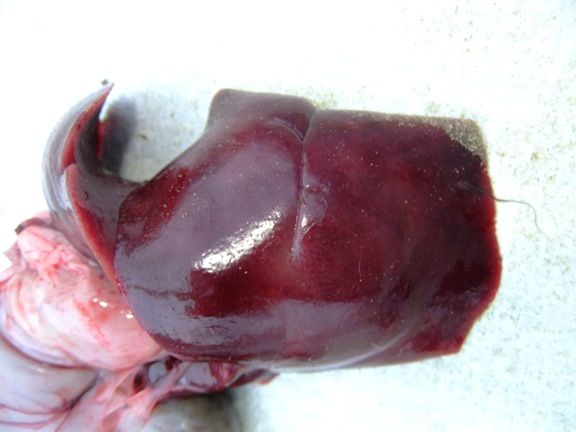
Liver (the little spots you're seeing is feed bag dust, I did all of this on an empty feed bag)
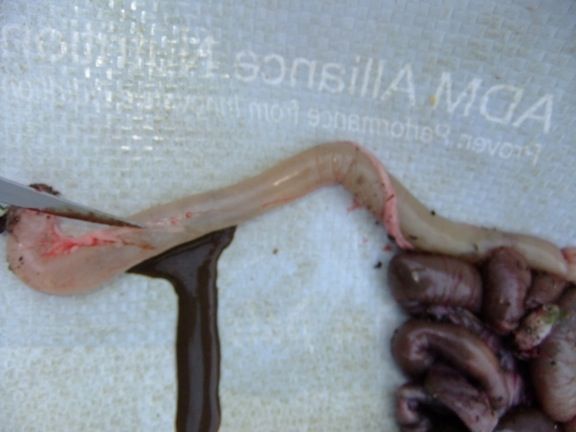
Before I cut into the colon
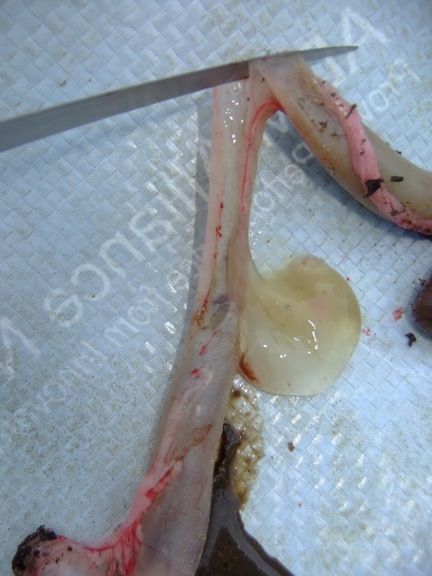
The colon contents
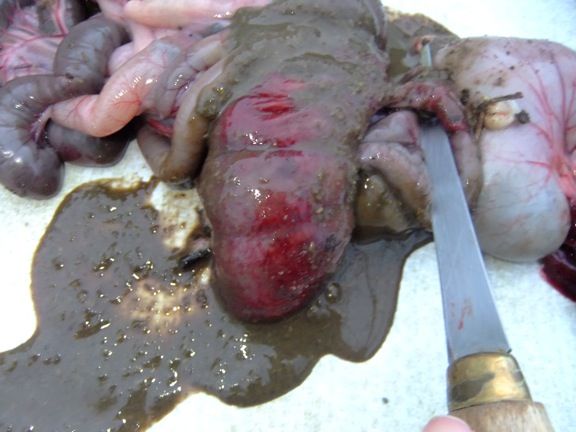
Hemmorrages and the extremely liquid, foul smelling cecum contents
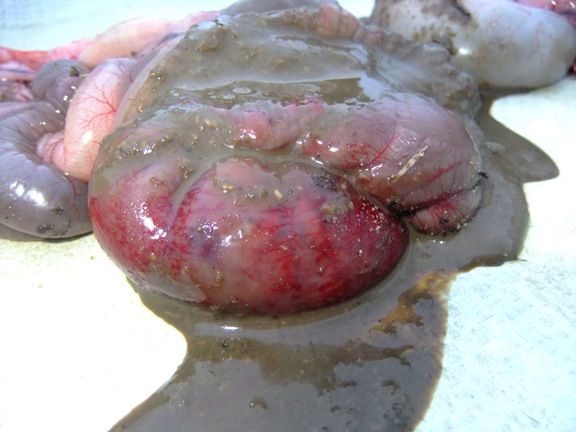
Cecum again
---------------------
I have a recently dead (keeper, of course!) bunny in my fridge. Unless one dies sooner for fresher necropsy or one is actively sick, I plan on taking something in for a necropsy soon here after the holidays. I need answers. I cannot sell anything, and our bunnies were the cash cows last year on our farm.
A fellow rabbit raiser used to live on my property, and she bought/sold animals regularly, whearas I tend to just breed my keepers instead of buy them. She started seeing losses to bloat, and thena month or so later I was seeing the same issues. She and I would evaluate each other's litters - though never direct contact - so that's potentially how it spread. Who knows.
Kits as young as 1 week old affected by smelly diarrhea (1 week olds affected has happened only once). On these young kits, it was caked on and was dark brown, smelly. Treated with baycox and they got better (treated mom too) In that particular litter, I didn't loose a single one until the day I planned on weaning them at 6 weeks old - bloated, clear diarrhea, and lethargic so I put it and the whole litter down. Once one kit gets it, it spreads.
In older kits, bloat/sloshy cecum, rapid condition loss (bony), lethargy, no eating/drinking, death. Sometimes can get them to bounce back if I treat them with Baycox before it gets 'bad', but that gets expensive and doesn't always work if they're too far gone. Usually found dead the day after first signs noticed. The rear end is damp but NOT covered in diarrhea - clear contents of intestine with small flecks of hay/feed, not a lot though.
Cannot be correlated to 'stress' really - it can happen after they're eating solid food but before they're weaned. Or, it could be weeks after they're weaned and are seemingly doing great.
Adults and animals over 12 weeks of age are largely not affected, but I have lost one adult - she was new, so I kept her in isolation in the barn for a few weeks. After Iso period, I put her in a cage in my bunny barn, and she died about 1.5-2 weeks later. Wasn't home to monitor the progress nor did I open her up, but she did seem to have a little bit of wet hindquarters.
Treatment/prevention we've tried:
Everybody was put on corid preventative in the water. 1/3 teaspoon per gallon of water. ALL rabbits have been recieving it, every day, for over a month now.
Baycoxing them seemed to clear up individuals if caught early enough, so I assumed cocci. I had some who had diarrhea a few weeks pre-weaning, treated with baycox, they got better. I sold them, treated with baycox before they went *just in case*, though the litter was doing well. That new owner has since lost 21 rabbits (last I heard) including adults, adults on litters, growout pen kits (He has auto waterer and just threw the ones he got from me into his growout pen) etc. I now have to compensate him for his losses on top of not being able to make any sales because I don't want it to happen again. That being said, a lady who bought some from me a week after that man (but before I heard of any issues) has 3 NZ's from me that were in our dog kennel growout pen with the remainder of the litter the other man bought from me, and they're doing well. The only difference was that her NZ's were on a weeks worth of corid prevention.
I do not feed hay in my raised-floor growout pen (too messy), but do feed it in my dog kennel growout pen. Everywhere else gets hay, doesn't seem to make a difference as rabbits are affected at any time and wether there is hay or not. Does with litters and the growout pen get free choice 18% PenPals. Babies continue getting the 18% until they reach standard weight for the breed (silver fox, New Zealand). Adult bucks and non-working rabbits get 1 cup 15% pellet. High quality feed, no mould, no diet change that I can think of.
Sanitized our cages - torched, scrubbed, sanitized with a 10% ammonia solution and a strong Roccal (vet disinfectant) solution. Soaked hay feeders, j-feeders, water dishes in strong roccal solution for extended periods. This was after 2 weeks on corid prevention, with the idea being that if it's cocci, I'll have reduced the number the adults are shedding by the time I clean the environment, and therefore reduce the number future rabbits can encounter. Our cages are wood frame cages. and I would *not* call them 'filthy' conditions. They stay pretty clean IMO, because I"m sure to clean out corners very regularly.
Necropsy on 7 week old 'recently' dead bunny (still slightly warm but possibly more than an hr dead): Liver/heart normal - no signs of spots/necrosis that you'd see with tyzzer's or hepatic cocci. Liver was normal/a good color. Heart was perfectly normal. Lungs normal. Cecum was fluid filled and had hemmorrages on the outside -no blood in the cecum. Contents foul smelling. The colon was completely full of thick jelly- like mucoid enteritis in overdrive - zero fecal pellets that are still found in cases of mucoid enteritis. Hindquarters were wet with this jellylike stuff.

Liver (the little spots you're seeing is feed bag dust, I did all of this on an empty feed bag)

Before I cut into the colon

The colon contents

Hemmorrages and the extremely liquid, foul smelling cecum contents

Cecum again
---------------------
I have a recently dead (keeper, of course!) bunny in my fridge. Unless one dies sooner for fresher necropsy or one is actively sick, I plan on taking something in for a necropsy soon here after the holidays. I need answers. I cannot sell anything, and our bunnies were the cash cows last year on our farm.



